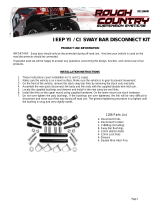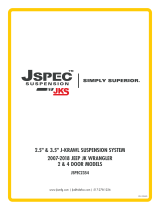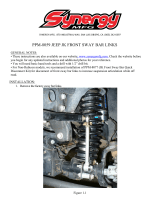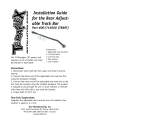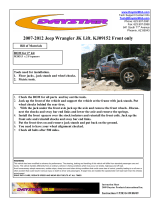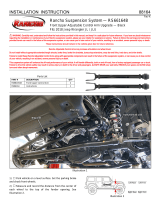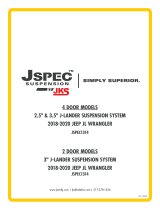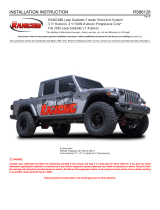
1
INSTALLATION MANUAL
FOR
ROCK KRAWLER SUSPENSION, INC.
JT PRO-X MID ARM SYSTEMS
2019 1st EDITION
11/01/2019

2
Dear customer: Thank you for purchasing the best system on the market for your Jeep Vehicle.
We are sure you will be happy with this system after your installation is complete. Please take
your time during the installation and be sure to do it correctly. Completely read the directions
before starting your installation so you know what to expect. Remember, your personal safety
depends on it. Should you have any questions during this installation feel free to give our tech line
a call (518-270-9822) and we will be happy to help you.
WARNING
• Properly block and secure vehicle prior to installation.
• Always wear safety glasses when using power tools.
• Rock Krawler Suspension recommends the use of Loctite on all hardware, unless noted otherwise.
• The use of limiting straps is recommended to avoid possible damage from over extending the suspension of your vehicle.
• Read and understand all instructions, warnings and safety precautions in these instructions and your owner’s manual before
attempting to install these components.
• Proper installation of Rock Krawler Suspension products requires knowledge of recommended procedures for disassembly/assembly
of OE vehicles and components. Access to OE shop manuals and special tools are required. Attempting to install this kit without
knowledge of these procedures may affect the safety of your vehicle and or the performance of these components. Rock Krawler
Suspension, Inc. strongly recommends that this system be installed by a certified mechanic with off road experience.
• Rock Krawler Suspension does not recommend combined use of suspension lifts, body lifts or other lift devices. Combined use of
lifts may result in unsafe and unexpected handling characteristics. Also, many states now have laws restricting Vehicle lift, bumper
heights and other alterations. Consult local laws to determine if your proposed alterations (including installation of this system)
comply with your state laws.
• Rock Krawler Suspension does not condone or authorize the use of any other suspension components with its products. Should Rock
Krawler Systems or components be installed in junction with other products or not per the provided instructions Rock Krawler
Suspension warranty is void and is not to be held accountable for any resulting actions.
Note: BE SURE TO CHECK ALL FASTENERS FOR
PROPER TORQUE BEFORE TEST DRIVE. RECHECK
AFTER 500 MILES AND BE SURE TO CHECK
PERIODICALLY.

3
Driving and Handling Tips
• For Highway driving it is best to have the front sway bar connected. This will give you the on highway ride and
handling characteristics you expect. If you choose otherwise, you do so at your own risk.
• The ride quality and handling that Rock Krawler is known for is based on using OEM sway bars front and rear
with approved shocks. Using any components other than directed can result in adverse handling characteristics
and poor ride quality.
• For Off-Road use it is best to have the front sway bar disconnected and the rear sway bar connected. This will
allow your suspension to do its intended function. Our suspension will give your vehicle unmatched articulation
which will proved traction and feed back to keep your vehicle moving in almost all conditions. Let the suspension
do the work! Even if you are a Rubicon Owner for most situations we recommend manually disconnecting the
front sway bar.
IMPORTANCE OF JAM NUTS
This is a note about jam nuts and the consumer's responsibility. The installer is the person or persons initially
responsible for the proper setup of the suspension system and/or components and the initial tightening of the
jam nuts. The jam nuts not only hold the orientation of the joint it is on but it is the single component that puts
the necessary pre-load on the joints threads. The consumer or vehicle owner is the person or persons
responsible for maintaining the jam nuts tightness. Failure to do so will result in the rapid deterioration of the
threads in the control arm and will impose a "cause for concern" for the occupants of the vehicle. Failure to
comply with the warnings heeded in the directions regarding the amount of threads showing past the jam nut
will also result in the same "cause for concern" for the occupants of the vehicle. All of the above items are the
responsibility of the vehicle owner and or installer. If a threaded section of a component is bad it will show itself
defective immediately. Threads that fail over time are due to improper maintenance of jam nuts and can be
proven very easily. Thread sections and jam nuts not properly maintained or setup, are not covered under
warranty. This is the end user and installer's responsibility.
ORIENTATION OF JOINTS
Orient the Krawler Joint for maximum amount of movement with the head of joint perpendicular to bolt / head of the
joint vertical in the mounting bracket. This same rule for orientation needs to be followed for all heim joints. The
photo below shows the right way (LEFT SIDE) and the wrong way (RIGHT SIDE) to orient a joint.
^RIGHT WAY^ ^WRONG WAY^

4
MAINTAINING JOINTS
Krawler Joints/Pro Flex Joints, Anti-Wobble Joints and Pro Disconnect Joints
The Pro Series Krawler Joints, Pro Flex Joints, Anti-Wobble Joints and Pro Disconnect Joints are greaseable.
They come pre-greased from the factory. The grease valley is machined into the housings. The small 7/8 shank
joints and track bar greasable joints will flow through grade 0 or grade 1 grease. The large joints will flow
through up to grade 2 grease. They will not take a lot of grease nor do they need a lot of grease. Approximately
every 3 to 6 months under normal operating conditions they should be greased. This is condition and use
dependent so please use common sense. Over lubrication or using the incorrect grade of grease can do damage
to the joints and hydraulically displace the race way material causing a sloppy joint condition. DO NOT USE
RED AND TACKY GREASE EVER! THIS IS WHEEL BEARING GREASE AND SHOULD NEVER BE
USED!
If the joint is not loose, it is not bad. Only if the ball is sloppy in the joint housing is it a bad joint and should be
rebuilt. Krawler Joint Raceways, Pro Flex Joint Raceway, or Anti-Wobble Joint Raceways are available
through Rock Krawler Suspension or an authorized dealer.
Please note: If you are not using the full range of motion of the Krawler Joint, Pro Flex Joint or Anti-Wobble
Joint very often, the lubrication will not be moving inside the joint. In such cases we recommend spraying down
the outside of the Joint with WD-40 or Liquid Fluid Film to ensure the race ways do not dry up. In highly
corrosive environments it is also recommended to spray down the suspension components with WD-40 or
Liquid Fluid Film. This will minimize corrosion of the components do to exposure to the elements.
HEIM JOINTS (Non- rebuildable spherical joints)
All Rock Krawler Heim Joints use Teflon Liners and thus are self lubricating. They too can also benefit
from spraying down the outside of them liberally with WD-40 or Liquid Fluid Film. Grease should never
be applied to them! Take caution when using cleaners and detergents on your vehicle as it can ruin the
adhesives used on the Teflon liners yielding a bad heim joint!
SUGGESTED STARTING LENGTHS
Front Track Bar (RK06187)
3.0” lift – 34 5/16”
5.0” lift – 34 ½”
Front Lower Control Arms (RK06184) Front Upper Control Arms (RK06697)
3.0” lift heights – 24 5/8” 3.0” lift heights – 20 9/16”
5.0” lift heights – 24 11/16” 5.0” lift heights – 20 5/8”
Rear Lower Control Arms (RK07380) Rear Upper Control Arms (RK07507 A/B)
3.5” lift heights – 23 ¾” 3.0” lift heights – 24 5/16”
5.0” lift heights – 23 7/8” 5.0” lift heights – 24 ½”
*Please Note: All Control Arms, Track Bars, and Sway Bar Links come preassembled, but require
adjustment to the above recommended starting dimensions. These measurements are taken from the
center of one bolt hole to center of the other bolt hole. Please check out our Rock Krawler Youtube
Channel if need be for how to set the control arms properly and the importance of Jam Nuts…

5
TORQUE VALUES FOR HARDWARE AND JAM NUTS
• All 10mm and 3/8 bolts are torqued to 30-35 ft-lbs.
• All 12mm and ½” bolts are torqued to 75-80 ft-lbs.
• All 14mm and 9/16” bolts are torqued to 90-100 ft-lbs.
• All 16mm and 5/8” bolts are torqued to 120-140 ft-lbs.
• All 7/8” Jam Nuts are to be torqued 200-220 ft-lbs. Up to 5/8” of threads showing past the jam nut is safe for final
adjustment. These specifications are critical for the overall longevity of the threaded section.
• All 1” Jam Nuts are to be torqued to 250-300 ft-lbs. GET YOUR BIG BOY PANTS ON! Up to 3/4” of
threads showing past the jam nut is safe for final adjustment. These specifications are critical for the overall
longevity of the threaded section.
• All 1 1/4” Jam Nuts are to be torqued to 275-325 ft-lbs. GET YOUR BIG BOY PANTS ON! Up to 7/8” of threads
showing past the jam nut is safe for final adjustment. These specifications are critical for the overall longevity of the
threaded section.
FRONT OF VEHICLE (Perform all Steps for the System You Are Installing
1) Make sure vehicle is on a level, hard working surface if you are using a floor jack and jack stands.
2) Block the rear wheels so the vehicle cannot move and make sure the emergency brake is applied.
3) Raise and support the front of vehicle with safety jack stands. Locate jack stands on the frame in front of the
axle.
4) If you are using a vehicle lift, place the lift arms according to those specific vehicles lifting procedures. Ensure
that the lift arms will not interfere with the components that are being replaced.
5) Remove the front rims and tires with axle supported by a floor jack.
6) Remove the front shocks. Save the OEM hardware to install the new shocks.
7) Remove the front sway bar links and discard them.
8) Remove the nut holding the factory brake line to the OEM lower control arms. Clip the ties holding the pass.
side disconnect motor cable from the passenger side front upper control arm and disconnect motor housing. Be sure
to add slack to the breather tube. Remove the metal bracket that held the factory brake line to the control arm from
the brake line itself by prying it off the line or gently cutting it off. This will provide you with more than enough extra
brake line slack. All are shown below.

6
Remove Brake Lines from Arms Clip for Breather Line Slack
Remove the plastic clips holding the pass. disconnect motor cable from the upper arm and motor housing as shown.
9) Lower the front axle assembly onto jack stands.
10) Remove the front track bar from the vehicle and save the OEM hardware for reuse.
11) Remove the front springs.
*Please Note: For all OEM components being reused, loosen the mounting hardware at all connections so you do not
overstress the OEM vulcanized rubber bushings. Failure to do so can result in a rougher than expected ride, adverse
handling and premature wear of the OEM components.
12) Remove the front lower control arms and save the OEM hardware for reuse.
13) X-FACTOR Remove the front upper control arms and save the OEM hardware for reuse.

7
14) For the 3.0” and Taller Systems, the drag link end will be your limiting factor without shocks to allow the axle to
droop. For these systems, we recommend you separate the drag link from the knuckle connection to allow for
ease of axle movement.
15) To make servicing your control arms easier and to have the Krawler Joint Zirc fitting facing upward at the axle; we
recommend you cut a little relief in the upper control arm mount as shown. A hole saw is a simple way to make a
nice, clean cut. Then add some paint of your choice to minimize rust later on.
16) If you received or purchased separately the Rock Krawler front stackable bump stops, now is a great time to drill
the lower bump stop pad with a ½” drill bit to make installation of the stackable bump stops easy. We recommend
2 or 3 pads for 3.0” of lift, 4 or 5 pads for 5.0” of lift based on tire size/wheel/fender/shock options. Choose the
proper ½” bolt from the bump stop kits.

8
17) Remove the OEM spring isolators or spring seats on the axle and replace them with the supplied Rock Krawler
spring seats. They are not side specific and use the locating pin on the axle to set their orientation. Please see
below.
New Bottom Spring Seats Shown with Bump Stop Stack in Place
18) X-FACTOR Install the supplied front upper control arms set to the specified length for your kit according to
our measurements. Secure using the OEM hardware. The bend in the upper arms are designed for frame
clearance and go away from the frame. Be sure to rewrap the OEM heat shielding products after installation
is supplied on your vehicle.

9
Driver Side Front Upper Arm Showing Proper Bend Orientation (Away from the frame)
19) All Systems; Install the front lower control arms set to the specified length for your kit according to our
measurements using the OEM hardware.
*Please Note: The bend in the arm is for improved ground clearance and goes up. The Krawler Joint (Zinc Plated
Spherical Joint) goes to the axle and the Pro Flex Joint (Bushing Joint) goes to the frame.
Frame Side Axle Side
20) Install the supplied front coil springs. Make sure the bottom winding of the coil butts up against the stop in the
new bottom spring seat and the top winding is properly centered using the OEM spring pad on the frame. If the
coil is not seated properly it will bow more than it should and can damage your coil.
21) Install the front shocks using OEM hardware.

10
**Note: It your OEM shock bolt runs into the control arms flip the lower shock hardware around.
22) As you are compressing the suspension, install the front track bar reusing the OEM hardware. Be sure to set it to
the starting dimensions for your system as specified above. The rebuildable Anti-Wobble joint goes to the frame
connection and the heim joint with high misalignment spacers go to the axle connection as shown below. Helpful
hint. Be sure to have the steering column unlocked so the axle will swing side to side freely.
Frame Side Axle Side
23) Reattach the drag link to the passenger side knuckle.
24) Choose your front sway bar link package (Either Disconnects or No Limits Links (Rubicon Models)). For standard
disconnects follow steps A through D. For No Limits Links follow steps E through G.
A. For Sway Bar Disconnects (No Limits Rubicon Applications Proceed to No Limits Section) Install the newly supplied
Sway Bar End Link Relocation Brackets, Pro Disconnects and Sway Bar Straps. Set the center to center length of the
assemblies as noted below. Please note: There is a specific Driver Side and Passenger Side Sway Bar Link Relocation
Bracket. The Driver Side is thicker and has a wider gap.
Passenger Side Driver’s Side
B. The driver side sway bar link relocation bracket has the wider gap of the two brackets. Attach it to the OEM sway
bar link tab on the axle. Push it down until it rests on the stock mount and secure it with the supplied ½” x 1.5” bolt,

11
two ½” washers, and ½” nylok nut as shown.
C. The pass. side sway bar link relocation bracket has a narrower gap than the driver side. Attach the relocation
bracket with the supplied 1” long aluminum spacer between the supplied bracket and the OEM track bar mount as
shown using the supplied ½” x 3.0” bolt, washers and nylok nut as shown.
Recommended Starting Lengths 3.0” Systems 8.25”/ 5.0” Systems 9.00”
D. To install your sway bar link straps use the supplied 5/16” Bolt, Washers and Nut to attach them as shown to the coil
spring bucket. Or you can drill a hole in a more preferred place of your liking.

12
E. For No Limits Links
Set your sway bar links to the length as shown below based on lift height. Torque the jam nuts to 60-75 ft-lbs with
the joints in line with one another. This can be done in the vehicle.
Recommended Starting Lengths 3.0” Systems – 11” / 5.0” Systems - 12”

13
F. Start with the side of your choice – Use the supplied 12mm x 70mm bolts, four washers and locknut for each
side. Refer to the images below for the orientation of hardware. One washer connects the head of the bolt, that bolt
goes through the sway bar link and through the sway bar hole. Then attach another washer followed by a locknut.
Passenger’s side connection shown
G. Torque the two 12mm bolts to a value of 75-80 ft-lbs.
25) Tighten all connections per the recommended torque specs above.
26) Put the tires and wheels back on the front end and carefully lower the vehicle to the ground.
REAR OF VEHICLE (Perform all Steps for the System You Are Installing)
1) Make sure vehicle is on a level, hard, working surface if you are using a floor jack and jack stands
2) Block the front wheels so the vehicle cannot move.
3) Raise and support the rear of vehicle with safety jack stands. Locate jack stands on the frame behind the rear
axle.
4) If you are using a vehicle lift, place the lift arms according to those specific vehicles lifting procedures.
Ensure that the lift arms will not interfere with the components that are being replaced.

14
5) Remove the rear rims and tires with axle supported by a floor jack.
6) Remove the rear shocks. Save the OEM hardware for reuse.
7) Remove the OEM rear sway bar links and discard them for they will not be reused.
8) Remove the wire form retainer from the back of the axle on the ABS lines to add slack to the lines as shown
below.
Brake Line Wire Form to be Removed
9) Lower the rear axle assembly onto jack stands.
10) Remove the rear coil springs.
11) Remove the rear track bar and discard it. It will not be reused.
12) Remove the rear upper control arms and discard them, save the OEM hardware for reuse.
13) Remove the rear lower control arms and discard them, save the OEM hardware for reuse.
14) Remove the break line bracket from the top of the differential and drill out the mounting holes to ½”.
15) If you have the torque shock on the top of the differential remove the shock and the mount from the vehicle for
it will not be reused.
16) Drill out the (4) cast threaded bosses on top of the differential with the supplied 27/64 drill bit. Just clean out
the threads. You do not need to make the holes any deeper. Be sure to use some WD-40 or drill lubricant to
keep the drill bill cool.

15
17) Blow out the (4) cast holes you just drilled out ensuring no particles in the holes. You can also use a shop vac
to try to suck out any particles if need be.
18) Using the supplied ½-13 RHT bottoming hand tap – tap the holes to ½- 13 RHT. Be sure to use WD-40 or
tapping lubricant. Do not force it. Take your time. Be sure to tap the holes straight and go all the way to the
bottom of the hole.
19) Blow out the (4) cast holes you just drilled out ensuring no particles in the holes. You can also use a shop vac
to try to suck out any particles if need be.
20) Install the rear cradle.
A Bolt the rear cradle to the top of the axle housing using the supplied ½ - 13 x 1.5” long bolts and
spiral lock washer. Be sure to put the front brake line bracket on top of the rear truss using the holes
it was installed in prior. Tighten these bolts first. This will suck the rear truss down so it sits flush
prior to tightening the u-bolts.
B. Using the supplied U-Bolts, spiral lock washers and nylok nuts, tighten the u bolts securing the
rear cradle to the axle tubes.
Please note: per Dana recommendations, if you are running larger than 37” tall tires or are going to
be using your JT hard core off road, they are requesting the rear cradle be fully welded to the axle
tubes as well prior to any hard core off road use.
Rear Cradle Top View Rear Cradle Back View

16
21) Install the rear upper arms using the OEM rear upper control arm hardware. Please note: there is a driver side
and passenger side rear upper arm assembly. The Pro Flex Bushing goes to the frame connection and the
adjustable Krawler Joint end goes to the rear cradle. The bend in the arm goes down on each side. One side to
clear the exhaust and the other side to clear the charcoal canister. Use the starting dimesnions from above and
adjust each arm symmetrically to maintain the rear axle perfectly centered. Do not allow more than 7/8” of
thread to show past any jam nut for proper thread engagement.
Rear Upper at the Frame with Zirc Up Rear Upper at the Axle with Zirc Up or Down
22) Install the rear lower control arms set to the specified length for your kit according to our measurements using
OEM hardware.
*Please Note: The bend in the arms is for improved ground clearance and goes up. The Krawler Joint (Zinc Plated
Spherical Joint) goes to the axle and the Pro Flex Joint (Bushing Joint) goes to the frame. Do not allow more than
3/4” of thread to show past any jam nut for proper thread engagement. Same as the front lower control arms.
23) Install the spring seats on the axle. The thick part of the spring seats goes toward the rear of the vehicle and is
marked R. The thin part is marked F for front. There is a specific driver and passenger side marked by a 1 and
2 on the bottom of the spring seats.
For gas model JT’s with the fuel tank on the passenger side;
The thicker spring seat marked 2 on the bottom goes on the passenger side axle mount. The thinner spring
seat marked 1 on the bottom goes on the driver side axle mount.

17
Pass. Side Rear Spring Seat Shown Installed
*Please note: When Installed with the coil springs at ride height with the pinion angle set properly, these spring
seats return the lower coil seat to a neutral or level position. This is their primary function which minimzes rear
spring bow. The difference in thickness accounts for most common asymetrical loading conditions or compensates
for vehicle lein while maintaining the same coil spring side to side for optimal performance.
24) Install the Rock Krawler rear coil springs. Make sure to put the closer wound coils up and the end coil winding is
sitting in the top spring seat properly.
25) Install the rear shocks using the OEM hardware.
26) If purchased separately or included in your system, install the RK fabbed rear bump stops. Our rear fabricated bump stops
mount to the factory bump stop pad using the supplied 3/8 x ¾ bolts, washers, and nylok nuts. Bolt up two of the
holes, mark two of the holes and drill them with a 3/8 drill bit.

18
Pass. Side Rear Bump Stop Pad Installed
27) Install the Supplied Pro Rear Sway Bar Links
A) The Bottom Mount gets secured with the supplied 12mm Bolt, Large Washer and Nylok Nut. The Large
Washer goes on the outside of the ball as shown to retain the ball and socket joint.
Rear Sway Bar Link Bottom Connection

19
B) The top connection reuses the factory rear upper sway bar link bolt and again, the large washer goes against
the ball to retain the ball and socket joint.
Rear Sway Bar Link Top Mount
28) Install the rear wheels and tires and lower the vehicle to the ground.
29) Tighten all mounting bolts at this time!
Recommended Alignment Specs are as follows;
3.0” Lift Height: 5.0 to 6.5 degrees of Caster with a .2 to .4 Cross Caster Split (.2 to .4 degrees more caster on the
pass. side than the driver’s side.)
5.0” Lift Height: 5.0 to 5.5 degrees of Caster with a .2 to .4 Cross Caster Split (.2 to .4 degrees more caster on the
pass. side than the driver’s side.)
Tow: 0 to slightly towed in but within factory specifications
The rear pinion angle should be down 2 – 3 degrees from the driveshaft as shown below.

20
*Please Note: If you do not have adjustable components you will not be able to dial in the alignment or pinion angle
settings so what you get is what you get…
A note about tires, wheels, tire pressure and how it effects ride quality:
Tire and Wheel combinations at a given tire pressure have their own spring and dampening rates associated with them.
This plays a major part in ride quality and off-road performance. The stock tire pressure settings on your Wrangler are
based on stock C rated light duty tires on 17” wheels. Larger aftermarket tires typically have a much firmer side wall
than the stock ones, thus increasing the spring rate and decreasing the dampening rate associated with the tires
themselves. Going from a C to a D or E rated tire also amplifies this effect. Increasing wheel diameters cuts down on
the sidewall size of the tire; for example going from a 17” wheel to a 20” to 22” wheels will increase the spring rate and
decrease the dampening rate of the tire and wheel combination. As you increase tire strength and wheel size it is common
to have to reduce the tire pressures in order to make your aftermarket tire and wheel combination feel like a stock stock
and wheel combination. Choose pressures wisely and safely! This is one part of your suspension tuning you can
do on your own.
Before hitting the pavement or the trails be sure to make sure the control arms are oriented
properly, all spherical joints (heim joints and Krawler Joints) are oriented correctly to allow
for maximum movement without bind, and all jam nuts have Loctite on them and are tight.
Make sure the axles are properly centered, pinion angles are correct, there is proper slack in
ABS lines, and all lines are properly routed. Go back over all your hardware and make sure
each connection is tightened to its proper torque spec. Check your vehicles articulation and
ensure that no moving parts contact or interfere with any other components throughout the
travel (brake lines, shocks, coils, sway bar links). Also check to see if at full flex your coil spring
Page is loading ...
/


